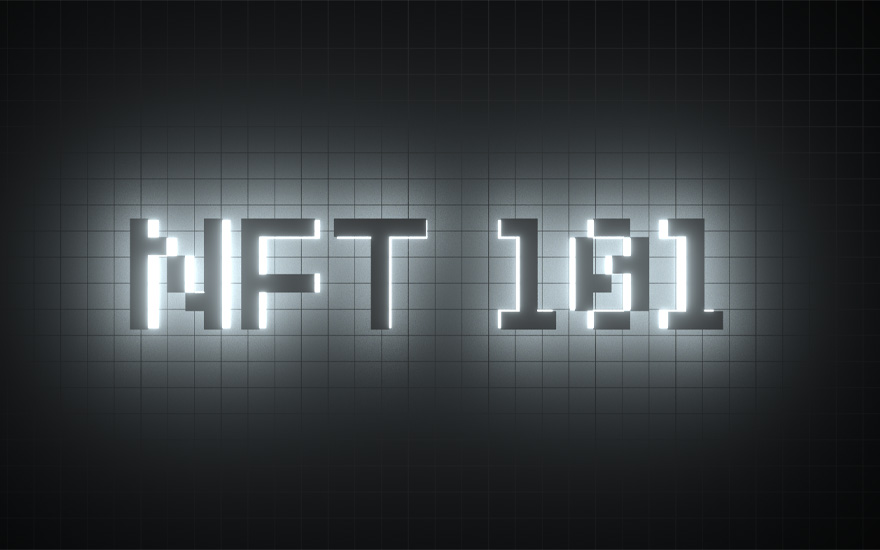
May 17, 2022
So what is an NFT actually? An NFT is a type of token created on a blockchain that is described as non-fungible because it cannot be exchanged, replicated or altered. Unlike cryptocurrency tokens, which can be exchanged, and are therefore considered fungible. NFTs don't actually do anything on their own; they just exist on the blockchain once they've been "minted" (created), and can be owned/held by someone in their blockchain wallet. However, the existence and ownership of this token creates a powerful way to prove that the person who holds that token in their blockchain wallet is therefore the owner of something, or should have access to something, undeniably. Due to the nature of blockchain technologies, the ownership of the NFT, and the rights it grants, represent an ultimate truth. What makes a blockchain different from say a normal database is all transactions are tracked and verified by millions of independent computers. This makes it exceptionally difficult to hack or to take down. A popular blockchain for NFTs is the Ethereum blockchain and its derivatives. Since it is possible for anyone to make an NFT it’s important to ask the question why aren't more people? While the actual creative aspect of the project may be easy for some people the hard part is what comes next. Paying for programmers and engineers to help you create a smart contract as well as build a site to sell your NFTs is extremely time consuming as well as financially draining, hence why Curios is such an amazing platform to use.
Buying and selling things on the internet has always been very tricky. There are too many stories of either party not following through with their agreement; when something as valuable as an NFT is at stake it is essential to have protection and legitimacy from both sides. This is when the idea of a “smart contract” comes into play. A smart contract generally is just code that executes actions for predetermined conditions. For NFTs the smart contract is the programming responsible for powering a NFT. The smart contract records the ownership of the NFT to the blockchain and tracks any transfers of that ownership. They receive the funds and deliver the NFT and they can even suggest royalties for secondary sales.
One of the most asked questions regarding NFTs is, what’s the point of buying an NFT if someone can just screenshot it or download it? Users who do this can save the art but they don’t have the ability to sell that screenshot as they don’t have the item of value, the NFT (certificate of ownership). Only the holder of the NFT as verified by the deployed smart contract can sell the item or even list the item on marketplaces. All marketplaces are contract driven and have verification steps to ensure that you are interacting with the intended NFT and not a fake.
One way to prevent a NFT from being copied or stolen involves the use of access NFTs. An access NFT uses the NFT to unlock access to private content on a secure server. A real world analogy would be a movie ticket. You can buy a movie ticket, post a picture of it online, resell it to a friend, gift it to a friend, lots you can do with that piece of paper. The movie ticket does not give anyone who views the piece of paper a way to view the movie, only the ticket holder at the time of the show can see the movie. Access NFTs are just like that, you can right click and save the access NFT image, but you will not be able to interact with the value component of the NFT as only the holder of the token gets to view that.
A major hangup for people just breaking into the NFT world is the crypto wallet. Crypto Wallets are difficult to set up and require understanding of how to safely store your private keys and how to access/reset your wallet if you lose your phone or computer. Additionally you have to fund your wallet with Cryptocurrency that you buy on an exchange and then transfer that crypto into your wallet. Platforms such as Opensea do not accept credit cards which could make transactions very difficult for someone who isn't engulfed in the space. While there are other platforms besides Curios that allow use of credit cards, only Curios has its system securely optimized for NFT purchases via credit card. Curios has built its niche on breaking down those traditional barriers to interact with Web 3 and NFTs. If you still think that NFTs are something you’d like to explore further, contact the Curios team today for a consultation!
https://www.lexology.com/library/detail.aspx?g=49a3d594-6a3d-4e3e-a95b-b0a8221e1c7a




